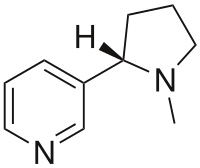
Photo from wikipedia
The landscape of worldwide tobacco use is changing, with a decrease in traditional smoking and an exponential rise in electronic cigarette use. No new nicotine cessation pharmacotherapies have come to… Click to show full abstract
The landscape of worldwide tobacco use is changing, with a decrease in traditional smoking and an exponential rise in electronic cigarette use. No new nicotine cessation pharmacotherapies have come to market in the last 10 years. The current therapies that have been approved by the United States Food and Drug Administration for nicotine cessation include nicotine replacement therapy, varenicline, a nicotinic acetylcholine receptor partial agonist, and the atypical antidepressant bupropion. Nicotine replacement therapy and varenicline both act on nicotinic acetylcholine receptors. Bupropion inhibits the dopamine transporter, the norepinephrine transporter, and the nicotinic acetylcholine receptors to inhibit smoking behavior. Notwithstanding these treatments, rates of successful nicotine cessation in clinical trials remain low. Recent pharmacological approaches to improve nicotine cessation rates in animal models have turned their focus away from activating nicotinic acetylcholine receptors. The present review focuses on such pharmacological approaches, including nicotine vaccines, anti-nicotine antibodies, nicotine-degrading enzymes, cannabinoids, and metformin. Both immunopharmacological and enzymatic approaches rely on restricting and degrading nicotine within the periphery, thus preventing psychoactive effects of nicotine on the central nervous system. In contrast, pharmacologic inhibition of the enzymes which degrade nicotine could smoking behavior. Cannabinoid receptor agonists and antagonists interact with the dopamine reward pathway and show efficacy in reducing nicotine addiction-like behaviors in preclinical studies. Metformin is currently approved by the Food and Drug Administration for the treatment of diabetes. It activates specific intracellular kinases that may protect against the lower metabolism, higher oxidation, and inflammation that are associated with nicotine withdrawal. Further studies are needed to investigate non-nicotinic targets to improve the treatment of tobacco use disorder.
Journal Title: Neuropharmacology
Year Published: 2020
Link to full text (if available)
Share on Social Media: Sign Up to like & get
recommendations!